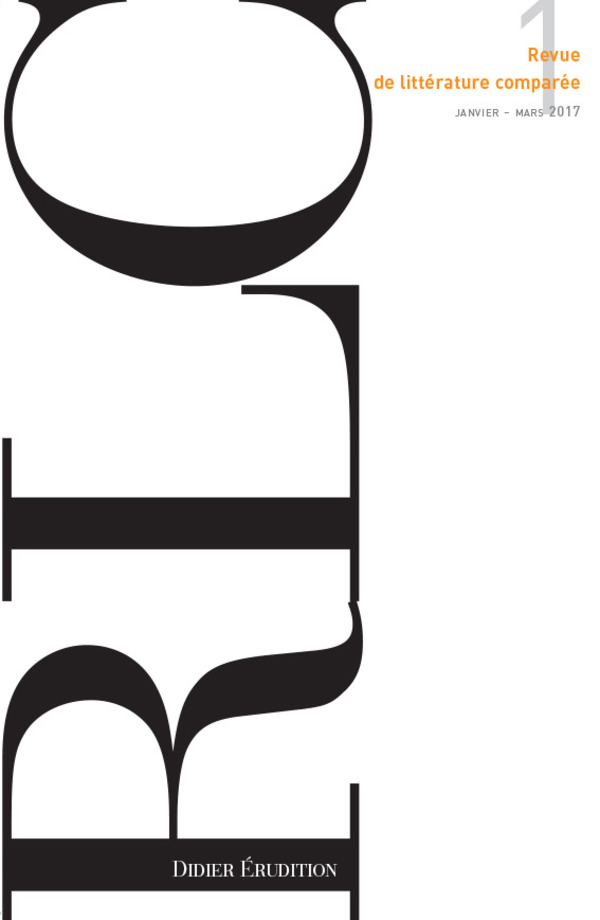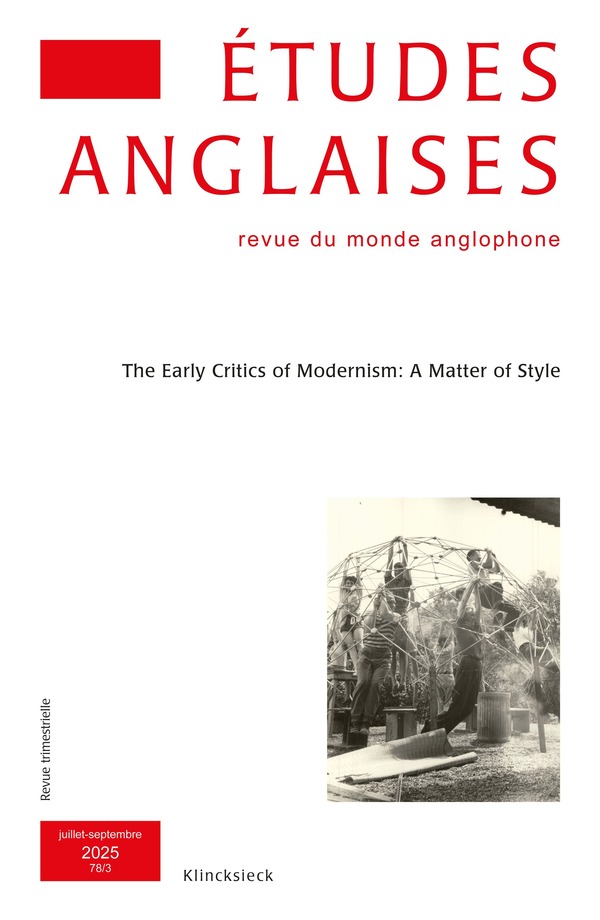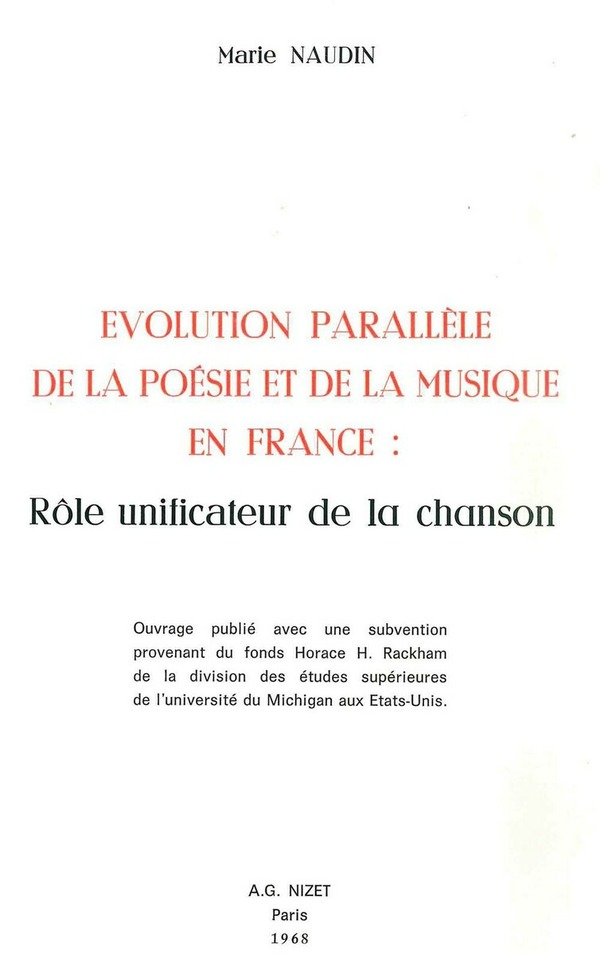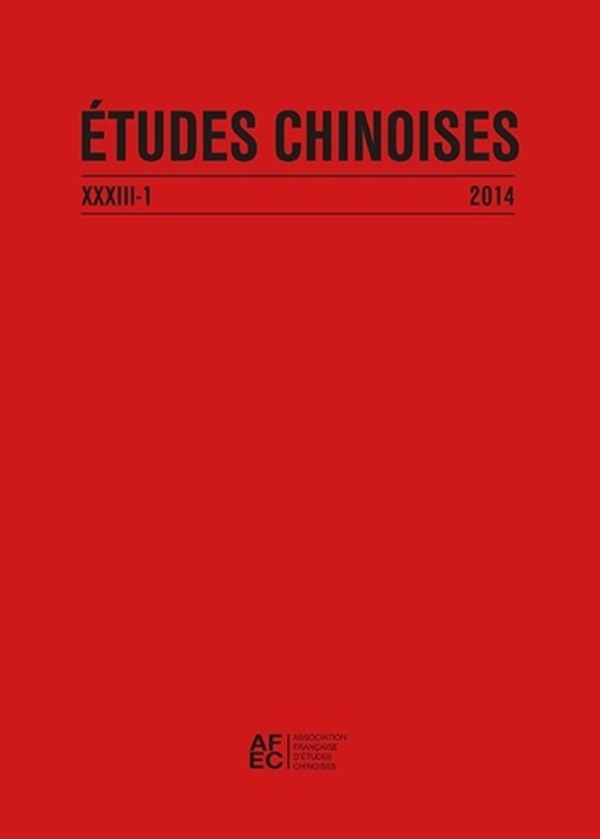Études chinoises XXXIII-2 (2014)
Chance, destin et jeux de hasard en Chine
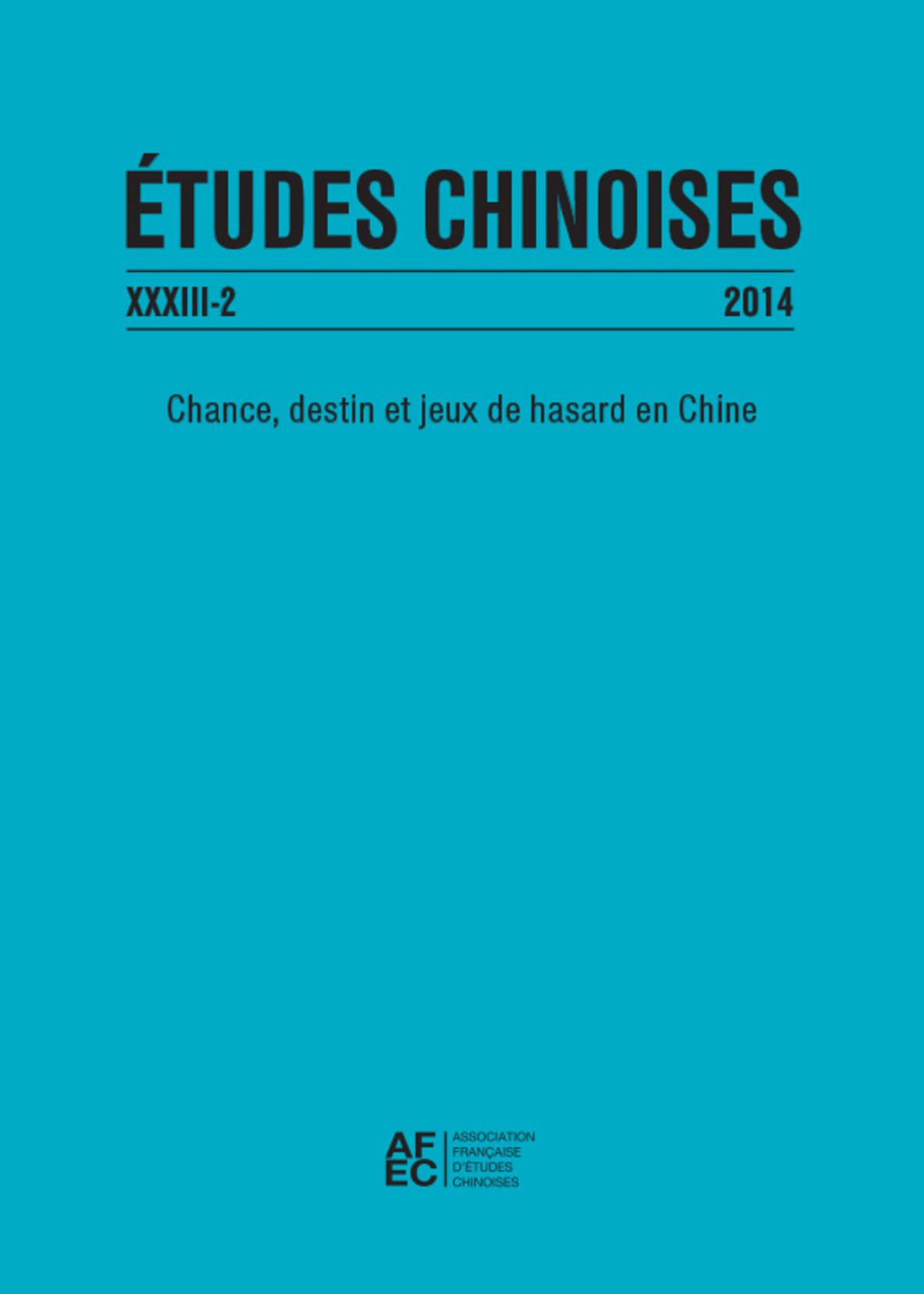
- 208 pages
- Livre broché
- 15 x 21 cm
- Études chinoises
- Parution : 27/03/2015
- CLIL : 3146
- EAN13 : 9782252039410
- Code distributeur : 47952
Présentation
Lisa Raphals, Debates about Fate in Early China
Abstract: Debates on the nature of self, agency, and fate are central to the Chinese philosophical tradition. In some cases, debates about fate overlapped with debates about mantic practices ("divination"). I begin by identifying five major issues of the Chinese debates, with particular interest in their relevance to contemporary philosophical debates about determinism. I then turn to a more detailed account of the arguments about fate ascribed to Confucius, the Mohists, Mencius, Zhuangzi, Xunzi, and Wang Chong. The final section compares their views on fate to those of contemporary philosophers who take a compatibilist position on questions of determinism and free will.
Stéphane Feuillas, Nature et destin dans la pensée de Zhang Zai 張載 (1020-1078)
Résumé – Dans la conception philosophique traditionnelle chinoise, les actes bons sont censés être rétribués par des présages fastes ; inversement un mauvais comportement induit mauvaise fortune. Depuis les écrits philosophiques de Mozi ou dans les dialogues consacrés à cette question dans le Mencius, cette formulation constitue le fondement de tout exercice moral et de la culture de soi. Le bénéfice existentiel résultant de la bonne conduite a été sévèrement critiqué par Wang Chong (27-c. 97) dont l'une des pierres de touche de la pensée consiste à couper le lien entre les comportements moraux et la vie effective de l'individu. Nombreux – et largement suffisants pour lui – sont les exemples de comportements moralement fondés qui n'ont pas été payés en retour de joie ou de bonheur, ou qui pire encore, sont sanctionnés négativement. Inversement, l'attitude du brigand Zhi dans le Zhuangzi, voleur, tueur, menteur, parangon de l'homme vicieux, sert de « preuve » à l'absence de lien consubstantiel entre morale et bonne fortune. Ce faisant, Wang Chong introduit les notions de chance, bonne ou mauvaise, et élabore sa propre théorie du fatalisme. Si tout est prévu à l'avance, si chaque homme reçoit d'emblée un « lot destinal » interprétable uniquement en termes de rencontres fortuites, plus aucune fondation n'est possible à la pratique morale autre qu'un intérêt personnel, idiosyncrasique et malheureux, pour la vertu. L'article revient sur ces questions en utilisant la pensée de Zhang Zai, telle qu'il la développe dans la Discipline pour les débutants (Zhengmeng). Il montre comment, selon lui, l'idée de destin doit être construite dans un lien indéfectible à celle de nature humaine, comment le destin évolue proportionnellement au développement des virtualités de sa nature. On mesurera ainsi la place qu'il accorde à la chance dans le mouvement général consistant pour l'homme à « atteindre sa destinée » ou plutôt sa « destination naturelle » (zhi yu ming).
Andrea Bréard, Homo ludens mathematicus La quantification du hasard dans les pratiques combinatoires en Chine
Résumé – Cet article porte sur le rôle des nombres dans les techniques de divination et les jeux de dominos en Chine à partir de la fin des Ming. Même si la quantification du hasard ne figurait pas explicitement parmi les sujets traités dans des textes mathématiques de la période pré-moderne en Chine, on montrera qu'une théorie combinatoire pourrait avoir joué un rôle dans certains schémas de gains et de pertes qui se distinguent clairement de ceux basés sur des considérations numérologiques. Ma contribution donnera d'abord un aperçu chronologique des conceptualisations du hasard par les mathématiques jusqu'à la fin de la période impériale, avant d'analyser, à rebours, les jeux d'un point de vue probabiliste. Même si cette approche peut sembler anachronique, elle permet néanmoins d'identifier les traces d'une mise en relation rationnelle des gains avec les chances d'obtenir une certaine combinaison de dominos et de poser la question de la circulation des savoirs mathématiques dans divers milieux sociaux, où se pratiquaient la divination et les jeux.
Frédéric Constant, La législation sur les jeux d'argent à l'époque des Qing
Résumé – Les jeux d'argent étaient extrêmement répandus dans la société chinoise de l'époque des Qing malgré la rigueur d'un interdit légal réaffirmé avec une grande constance. La prohibition des jeux était ancienne, et on la retrouve posée dès le droit des Tang. Plus que les jeux eux-mêmes, c'est le fait de miser des biens qui était condamné, et le droit déterminait la peine encourue en proportion des sommes engagées. Le législateur des Qing rompit en partie avec ce principe et tenta d'appréhender le jeu au travers de la multitude de ses ramifications sociales : l'ensemble des personnes associées aux jeux d'argent de façon plus ou moins directe étaient ainsi visées par le droit. En s'attaquant à tous ceux qui
fournissaient aux joueurs l'occasion d'assouvir leur vice, les Qing tentèrent de couper les racines du mal. Il n'en résulta qu'une complexification de la législation que l'administration, dépourvue de moyens suffisants, ne réussit jamais à mettre réellement en œuvre.
Xavier Paulès, Les limites de l'influence du modèle de Las Vegas dans l'offre de jeux de hasard à Macao : apports d'une mise en perspective historique
Résumé – La multiplication des gigantesques casinos à thème (Venitian, Galaxy, City of Dreams) à Macao depuis dix ans donne l'impression qu'on est en présence d'une nouvelle Las Vegas. L'arrivée d'opérateurs américains en 2002 a donné une impulsion nouvelle au secteur des jeux de hasard et introduit un « modèle vegasien » qui consiste essentiellement, afin d'élargir au maximum la clientèle fréquentant les casinos, à insérer les jeux de hasard dans une offre beaucoup plus large de divertissements (entertainment). Il reste que certains aspects de l'organisation du jeu à Macao se démarquent nettement du modèle vegasien. Le plus saillant d'entre eux est le règne sans partage du baccara. Cependant, la prédominance de ce jeu d'origine européenne depuis les années 1960 n'a jusqu'à présent jamais été expliquée de façon convaincante. Cet article a pour but de démontrer qu'un retour sur l'histoire des casinos de Macao depuis le milieu du XIXe siècle fournit des éléments décisifs d'explication.
Durant un siècle, à partir des années 1860, les casinos de Macao n'ont, à peu de choses près, proposé qu'un seul jeu à leurs clients : le fantan. Ce jeu purement chinois a donc largement façonné l'habitus des joueurs de l'ancienne colonie portugaise, et même, au-delà, de toute la Chine du Sud. Il est possible de montrer que le baccara, en dépit des apparences, présente des similitudes profondes avec le fantan, ce qui explique pourquoi c'est lui qui s'est imposé parmi tous les jeux européens proposés aux joueurs à partir du début des années 1960.
Stéphanie Homola, Le cas du « dragon chinois » : légende, destin et chance autour d'un jeu divinatoire
Résumé – Le « dragon chinois » (Zhonghua yitiao long 中华一条龙) est un jeu divinatoire contemporain qui se pratique avec des cartes à la manière d'un solitaire. Ce cas soulève tout d'abord la question de la circulation et de la transmission des jeux. On s'intéressera ainsi aux légendes qui accompagnent les jeux ainsi qu'aux conditions de l'enseignement des règles à de nouveaux joueurs. Rituel d'interrogation du
destin ou jeu pour attirer la chance, cet exemple permet également d'examiner les catégories de jeu et de rituel, de mettre en évidence les mécanismes qui les rapprochent et ceux qui les distinguent. On s'interrogera en particulier sur la nature de l'instance qui préside au résultat du jeu, sur l'effet qui est attendu du jeu et sur l'analogie entre la manipulation des cartes et celle du destin. Le cas du « dragon chinois » peut ainsi être utilement confronté aux réflexions théoriques récentes menées par Roberte Hamayon sur les mécanismes fondamentaux des jeux divinatoires ou des rituels pour attirer la chance.
English abstracts
Lisa Raphals: Debates about Fate in Early China
Debates on the nature of self, agency, and fate are central to the Chinese philosophical tradition. In some cases, debates about fate overlapped with debates about mantic practices (“divination”). I begin by identifying five major issues of the Chinese debates, with particular interest in their relevance to contemporary philosophical debates about determinism. I then turn to a more detailed account of
the arguments about fate ascribed to Confucius, the Mohists, Mencius, Zhuangzi, Xunzi, and Wang Chong. The final section compares their views on fate to those of contemporary philosophers who take a compatibilist position on questions of determinism and free will.
Stéphane Feuillas: Human Nature and Destiny in the Thought of Zhang Zai (1020-1078)
In the conception of traditional Chinese philosophy, good deeds are supposed to be rewarded by auspicious omens; conversely, bad behavior brought on bad luck. Beginning with the philosophical writings of Mozi or in the dialogues dedicated to this question in Mencius, this formulation constitutes the foundation of all moral practice and self-cultivation. The existential benefit resulting from good conduct was severely criticized by Wang Chong (ca. 27-97 CE), who took as one of the touchstones of his thought the severing of the link between moral behavior and the effective life of the individual. Many – and generally sufficient for him – were the examples of morally behavior based was not repaid in turn by joy or happiness, or even worse, were adversely punished. Conversely, the attitude of the bandit Zhi in the Zhuangzi – a thief, murderer, liar, and paragon of an evil man – serves as a “proof” of the absence of a commensurate link between morality and good fortune. In so doing, Wang Chong introduced the concepts of chance, good or bad, and developed his own theory of fatalism. If everything is predetermined in advance, if each man receives from the outset a “measure of fate” understandable solely in terms of chance meetings, no other foundation is possible for virtue in moral practice other than idiosyncratic and unfortunate self-interest.
This article turns to these issues through the thought of Zhang Zai, as he developed it in the Correct Discipline for Youth (Zhengmeng). It shows how, according to him, the idea of destiny should be constructed in a unbreakable bond to that of human nature, and how fate changes proportionally according to the development of the potentialities of that nature. Thus, it measures the place given to luck in the
general movement consisting for man of “reaching his destiny” or rather his “natural destiny” (zhi yu ming).
Andrea Bréard: Homo ludens mathematicus: The Quantification of Chance in Combinatorial Practices in China.
This article focuses on the role of numbers in divination techniques and the game of dominoes in China starting from the late Ming.
Even if the quantification of chance was not explicitly included among the subjects covered in mathematical texts of the pre-modern period in China, we will show that combinatorial theory may have played a role in certain patterns of gains and losses that stand out clearly from those based on numerological considerations. An overview of conceptualizations of chance by combinatorial mathematics up until the end of the imperial period reveals the theoretical importance of gaming and divination for mathematical considerations. Inversely, we can conjecture about the role that these mathematical theories might have played when looking at late imperial practices of chance from a modern probabilistic point of view. While this approach may seem anachronistic, it nevertheless allows us to identify traces of a
rational linking of winning with the chance of getting a certain combination of dominoes as well as to pose the question of the circulation of mathematical knowledge in various social settings where divination and games were practiced.
Frédéric Constant: The Legislation of Gambling in the Qing Dynasty
Gambling was extremely prevalent in Chinese society in the Qing period despite the strictures of a legal prohibition that were constantly reaffirmed. The prohibition of gambling was an ancient practice, one which first appears in Tang-dynasty law. More than the games themselves, it was the fact that property was wagered that was condemned, and the law determined the penalty in proportion to the sums involved. Qing legislation broke in part from this principle and tried to approach gambling through the multitude of its social ramifications: All persons associated more or less directly with gambling were thus covered by the law. By addressing all those providing gamblers the opportunity to indulge their vice, the Qing tried to cut off the roots of this evil. This resulted only in a the growing complexity of legislation which the administration, without sufficient means, never actually managed to implement.
Xavier Paulès: The limits of the Influence of the Las Vegas Model in Gambling in Macao: Approaches from a Historical Perspective
The proliferation of giant theme casinos (the Venetian, Galaxy, City of Dreams) in Macao in the last ten years gives the impression that we are in the presence of a new Las Vegas. The arrival of American operators in 2002 gave a new impetus to the gambling sector and introduced a “Vegas model,” which, in order to expand to the maximum the number of customers frequenting the casino, essentially
consists of including gambling in a much broader range of entertainments. However, certain aspects of the organization of gambling in Macao are distinctly different from the Vegas model. The most prominent of these is the unchallenged dominance of baccarat. However, the prevalence of this game of European origin since the 1960s has so far never been explained convincingly. This article aims to show that a reexamination of the history of Macao casinos since the mid-19th century provides key elements for an explanation. For a century starting in the 1860s, Macao casinos had, with few exceptions, offered only one game to their clients: fan-tan. This purely Chinese game had largely shaped the habits of players in the former Portuguese colony and even beyond, throughout all of South China. It is possible to show that baccarat, despite appearances, has profound similarities to fan-tan, which is why it is this game that has dominated among all European games available to players since the early 1960s.
Stéphanie Homola: The Case of “Chinese dragon”: Legend, Destiny and Luck in a Divination Game
“Chinese Dragon” (Zhonghua yitiao long 中华一条龙) is a contemporary divination game that is played with cards, like solitaire. This raises first the question of the circulation and transmission of games. It is thus of interest to trace the legends that accompany the game and the circumstances of teaching the rules to new players. As a ritual for divining fate or a game to bring good luck, this example also allows
us to review the categories of game and ritual and to highlight the mechanisms that both unite and separate them. In particular, this paper examines the nature of the proceedings that govern the outcome of the game, the expected effect of the game, and the analogy between the manipulation of the cards and that of fate. The case of “Chinese dragon” can be effectively examined in light of the recent theoretical
reflections of Roberte Hamayon on the fundamental mechanisms of divination games or rituals to bring good luck.
中文摘要
瑞麗 (Lisa Raphals) :古代中國有關命運的辯論
有關自我的本性﹑行動能力及命運的辯論,乃中國哲思傳統核心。在某些情況之下,關於命運的辯論與有關“占卜”的爭論部分 重疊。我在本文中首先識別出五個辯論議題,特別注意它們與當代哲學關於決定論的爭論之間的關係。然後細察孔子﹑墨家﹑孟子﹑ 莊子﹑荀子以及王充有關命運的論證。文章最後一部分把這些先人的觀點與當代採取決定論和自由意志相容立場的哲學家們之觀點進 行比較。
費颺 (Stéphane Feuillas) :張載思想中的性與命
在中國傳統哲學觀念裡,善有善報,惡有惡報。自墨子的論著以降,或在孟子有關該問題的談話裡,“善有善報,惡有惡報”的 格式乃是一切道德操練與自我修養的基礎。西漢的王充倒是嚴厲批評善行會給生活帶來好處的說法,他的思想的主力之一是,切斷道 德行為和個人實際生活之間的關聯。很多——對王充而言,多到足以佐證——是有道德的行為但是沒獲得喜樂或福氣的善報,或者更 糟糕的,得到負面的懲罰。《莊子》裡的盜跖是偷盜者﹑殺人者﹑欺騙者集于一身的邪惡之人的代表,被用來“證明”道德與好運之
間沒有聯繫。王充於是引進了運氣觀,好運或惡運,並且提出他自己的宿命論。如果一切都事先預設了,如果每一個人一開始就得到 一份“命運”,只能用偶然相遇來解釋的話,那麼對德性而言,道德的實踐就沒有任何原則基礎,除了個人特質、不幸的興趣。本文 用張載在《正蒙》裡所提出的論證來重新探察上述的問題。張載闡明他的看法,命運的觀點必須在與人性不可分的關係當中建構的, 命運的發展如何與人性潛能的發展成比例。我們因此可得知張載對人要“至于命”的一般行動當中,所主張的運氣份量。
白安雅 (Andrea Bréard) :游戯的人與數論 (Homo ludens mathematicus). 中國組合實踐當中偶然性的量化
本文討論中國明末以降占卜技術及賭博遊戲當中數字所扮演的角色。即使中國現代之前出現的數學論著裡所處理的主題當中並沒 明顯地指出“偶然性的量化”(la quantification du hasard),我們將提出,在某些贏輸圖式裡可能有一種組合的理論起了作用,那 些圖式很明顯地不同於數字學上思考的圖式。針對明末到清末通過數學組合而對偶然性進行概念化的過程之綜觀,能讓我們相反地來 從概率論的方法分析偶然性的實踐。雖然這種分析方法看起來是時代錯誤的,它仍然可以鑑定出賭贏與獲得某種賭牌組合的運氣有關 係的痕跡;因而探問數學知識在出現占卜和賭博現象的種種社會階層裡的傳播情形。
梅凌寒 (Frédéric Constant) :清代有關賭錢的法律
清代中國社會上賭錢活動極其盛行,即便法律嚴厲禁止賭錢。中國很早就在法律上禁止賭博,大唐律例裡就已經出現禁令。被定 罪的還不止是賭博行為,更是把資產作為賭博押寶,法律便根據賭者所投入的錢數多少來處罰。清代立法者部分打斷了這個原則,而 企圖經由賭博在社會中的多重分佈來理解賭博,因此法律所裁定的對象是,直接或間接與賭錢有關的全體人員。清代法律打擊所有那 些提供給賭者滿足他們的惡性之人,試圖以此從根切除邪惡。由此導致立法上錯綜複雜,由於缺乏足夠的執行方法,該法律從未確實 實施。
包利威 (Xavier Paulès) :澳門賭場上拉斯維加斯模式影響的有限性:從歷史角度得出的研究成果
澳門近十年來建造大量的龐大主題賭場(威尼斯人,銀河,新濠天地),讓人們以為身在一個新拉斯維加斯。美國賭場2002年進 入澳門,為澳門賭業帶來新氣象,引進了某種“拉斯維加斯”模式,那基本上是為了吸取最多的賭場常客,把賭博安插在某種更廣泛 的娛樂(entertainment)之中。然而澳門賭博結構的某些現象很明顯地不同於“拉斯維加斯”模式,其中最凸顯的是百家樂(baccara)的獨占鰲頭。這個源自歐洲的賭博遊戲自1960年以來最受人歡迎的情況,直到目前為止,還沒有叫人信服的解釋。本文主旨乃 要闡明,回顧十九世紀中葉以來的澳門賭場歷史,這能為我們提供解釋百家樂之所以最受歡迎的關鍵原因。自1860年以降的一百年期 間,澳門賭場幾乎只提供單一種賭博遊戲:番攤。這是純中國式的賭博遊戲,前葡萄牙殖民地的澳門,甚至整個中國南方都習慣玩番 攤。我們可以說明為何表面上不同於番攤的百家樂,內在深層則與番攤有諸多相似之處。這是為何在提供給賭場顧客的眾多源於歐洲
的賭博遊戲當中,百家樂自1960年初以來最受賭者歡迎。
賀樊怡 (Stéphanie Homola) :初探“中華一條龍”:圍繞著一種占卜遊戲的傳說﹑命運及好運
“中華一條龍”是單人獨自用牌卜卦的當代占卜遊戲,它首先引出的問題是,遊戲如何流傳又怎麼傳遞。我們因此對那些伴隨遊 戲的傳說以及那些教新學者遊戲規則的條件感興趣。作為探問命運的儀式或是吸取好運的做法,“中華一條龍”的案例讓我們也可探 察遊戲和儀式類型,並且凸顯出使它們相近的機制以及使它們有別的機制。我們將特別探究決定遊戲結果的機制之特性,探究所期盼 的作用以及牌的操作和命運的操作之間的相似性。是故,與侯貝爾忒.哈瑪雍(Roberte Hamayon)最近有關為了吸取好運而作的占 卜遊戲或儀式的基本機制所提出的理論上的思考對照之下,這個例子會顯得很有用。

